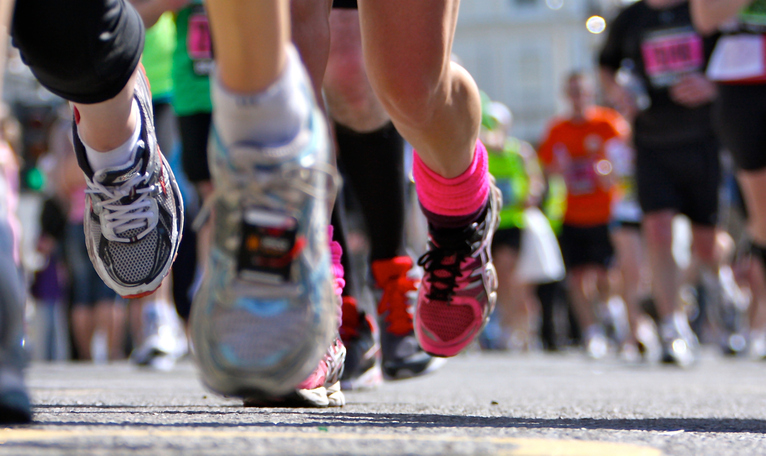A Half Marathon

Half marathons are becoming more and more popular and there are events most weekends across the UK. If you are looking for a challenge it might be something for you, especially if you have already tried a 5k or even 10k. A half marathon tends to be the next step after a 10k. To get to 13.1 miles would be a real achievement but it would not be so far that the training would be the only thing you have time for in your free time!
To train for a half marathon, it is important to have a regular running schedule. You should be looking at doing 3 or 4 runs each week. This will enable you to get fit enough to be able to do all 13.1 miles. It is also advised that you spend at least 10 weeks training for a half marathon.
So how do I train?
In the first instance you need to train regularly and do a sufficient amount of miles to get you body to adjust to running for long periods of time.
Initially you would work towards doing between 10-15 miles during your week and then build towards up to 30 miles a week. Within these runs it is essential to do one long run at an easy pace, which you can increase in length over time. This will help build up your endurance so you can run for a longer amount of time. When you spend longer times running, you get your brain, heart, lungs and muscles ready for your big race – the half marathon!
If you are just starting out, you do not need to be able to do a whole half marathon in training. A good 10 miles will give you enough to get to 13.1 miles on your actual race day. As a beginner your aim should be to complete the 13.1 miles rather than get the fastest time possible. The focus should be on your endurance, keeping going at a safe and moderate pace.
In training, however, you should do a couple of faster runs as this will keep up your endurance when you get tired in the second half of the half marathon. This faster pace could be you running a little faster than your usual 5k pace.
If you have never taken part in a race before, it may be worth signing up to a 5k or 10k so you can get used to the set up. You don’t have to go super fast, just get used to doing a race!
In the month before your half marathon it is good to do a few long runs. When you do these you should run at the same time and have the same foods. You should also wear your race day outfit and look for an issues that may occur.
If you want to go faster
Online you can find a number of intermediate or even advanced training plans.
A good aim is to try and get under the 2-hour mark to finish the half marathon.
What to Eat and Drink
You must think carefully about what your body needs before, during and after the half marathon.
If you do not have enough, you will run out of energy.
If you have too much you will need to stop for toilet breaks.
Before: high carb and low fiber usually 3-4 hours before a run. This allows your body time to digest. If your run is first thing you may just have to have a small portion of carbs. Protein is good for a longer run.
During: carbs again. This could be sports drink or energy bars. Try these before the race day so you see how your body responds.
After: carbs and protein. Have these soon after to help with recovery.
Drinking: have enough before, during and after. Under an hour water is ok but more than an hour an energy drink would help.
How to be healthy
Increase your miles slowly.
Stretch.
Have enough rest.
Have a rest day.
Alternate between long and short runs.
Try strength training to improve your running.
Listen to your body –if your body is hurting, take it easy!
Keeping motivated
Train with a friend or a group.
Get plenty of rest to help your body recover.
Think positive and train yourself mentally!
Do not over train. It can soon wear you down.
What to Wear
You will need a good pair of trainers, a top, shorts/cut offs, socks (and a sports bra).
Synthetic materials, which breathe and wick moisture are ideal.
You will be more comfortable reduce the risk of chaffage if you avoid cotton.
You can also get a vest that can carry your phone, keys, water etc.
You might need to think about a hat/sunglasses or a jacket.
A GPS tracker might be useful to keep an eye on your distance.
Vaseline can help fight against chaffage.
After Your Half Marathon
For every mile that you run, you should allow one day to recover.
When you feel you are not stiff or sore than you can go out on some easy runs.
Maybe take a break from structured training for a while – this can help you prepare better for your next running challenge physically and mentally.
